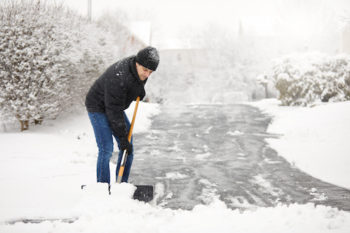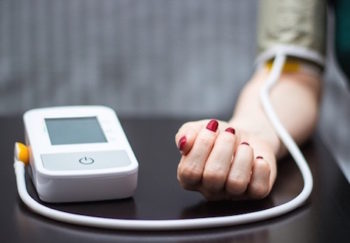
Before most of us venture out into the cold, we protect our hands with gloves, cover our head with a hat and slip on a warm coat. But did you know that it’s also important to protect your heart when temperatures drop?
Studies have shown that blood pressure increases in the cold. “Frigid temperatures make the heart work harder to keep the body warm,” says cardiologist Brandy Patterson, MD. “Arteries tighten, restricting blood flow and limiting the supply of oxygen to the heart and the rest of the body.”
This may explain why heart attacks and other cardiovascular events are more common in winter months. Another factor: overexertion. “People don’t realize the strain a little snow shoveling puts on the heart, especially when it’s freezing outside,” says Patterson. If you have cardiovascular disease, Patterson suggests the following tips to ensure you stay safe outdoors this season:
Bundle up
The right clothing can help insulate you from the cold and take some of the burden off of your heart to maintain your internal temperature. When you go outside, be sure to wear multiple layers and cover exposed skin, especially your head, to help trap body heat. If you are unable to keep your temperature above 95 degrees Fahrenheit, hypothermia will set in and put you at an increased risk for heart failure, respiratory distress or even death. Know the signs of hypothermia. They include: shivering, confusion, lack of coordination, slurred speech and numbness or tingling of the skin. If you believe you or a loved one is experiencing hypothermia, move to a warmer environment if possible and seek medical attention immediately.
Don’t overdo it
That crisp winter air may put a kick in your step, but if you aren’t in the best physical shape, it’s important not to overexert yourself. Your heart is already working overtime to keep you warm and your oxygen supply may be compromised, so pushing your body to shovel heavy loads of snow could spell trouble. The best option for those with heart disease is to avoid strenuous outdoor chores or activities when the temperatures drop. If you have no choice but to take care of your to-do list, then be sure to take frequent breaks. Get out of the cold and rest for 10 to 15 minutes approximately every half hour.
Limit alcohol consumption
Alcohol not only impairs your judgment, it can also inhibit your ability to sense cold, so you may be slow to notice the effects of hypothermia. If you’ve been drinking, it’s best to stay indoors where it’s warm.
Listen to your body
Know the signs of a cardiovascular emergency and don’t ignore the symptoms. If you experience chest pain, shortness of breath, back or jaw pain, a cold sweat and nausea or vomiting, call 911 right away.
Talk to your doctor
If you are being treated for heart disease or risk factors associated with heart disease, such as high blood pressure or diabetes, talk to your doctor before you head out for that winter hike or weekend ski trip. He or she will be able to provide more specific suggestions for keeping you safe in the cold.

